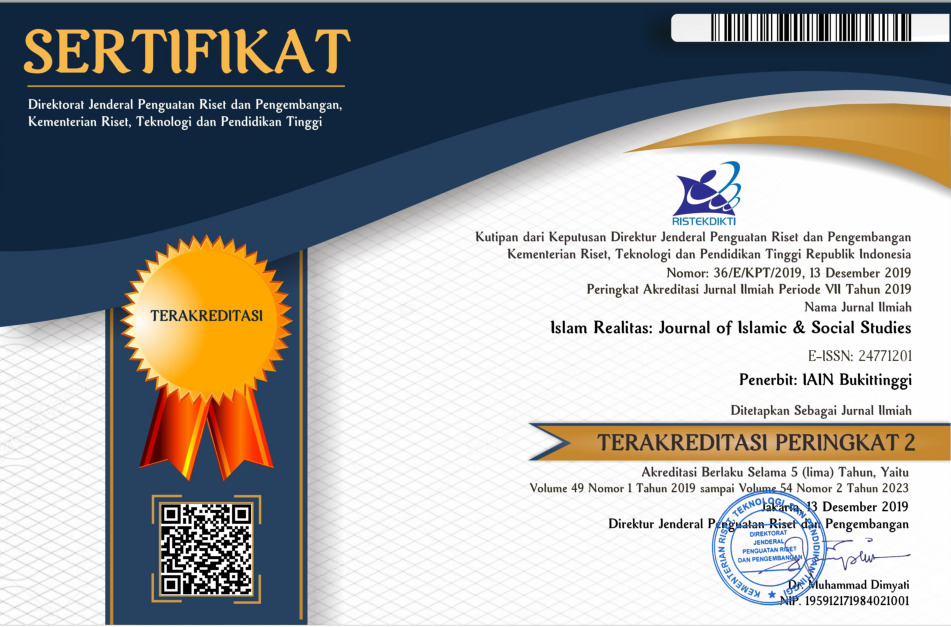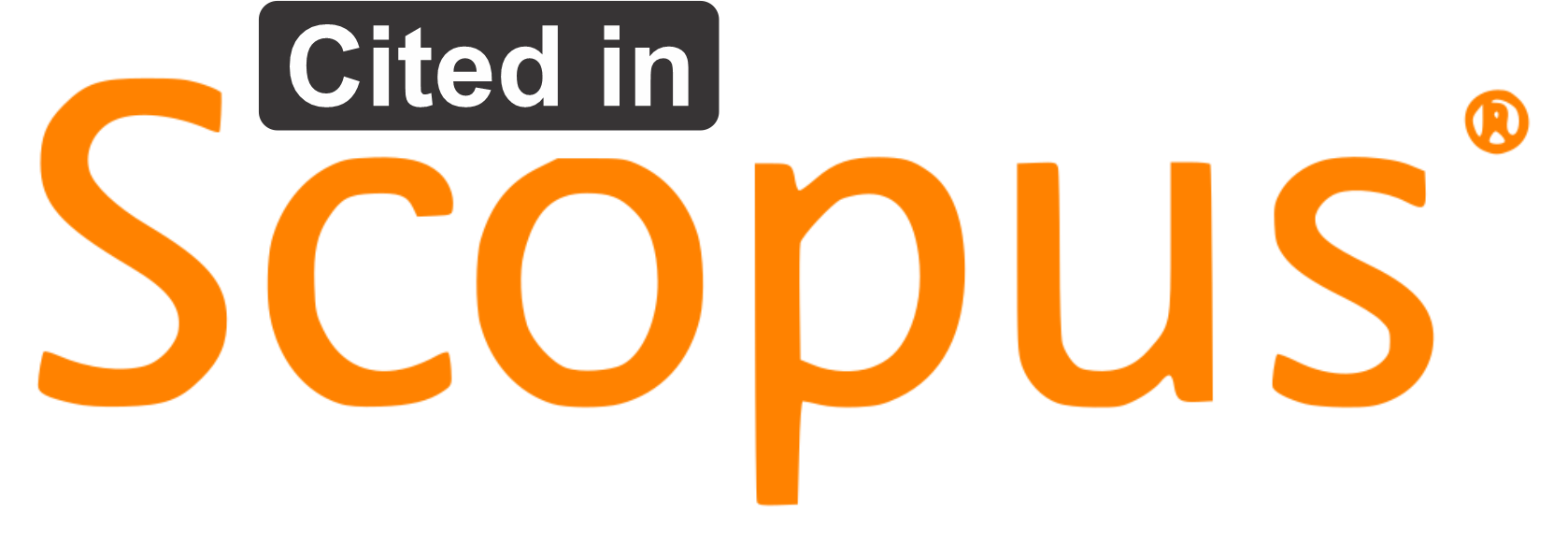New Concept of Ignorance: An Islamic Epistemological Approach to The Story of Moses as Relevant Reference for Contemporary Ulama
Downloads
The understanding of knowledge in the Islamic literature is more focus on the conception of knowledge itself, such as the epistemology of ma'rifah al-Ghazali, the epistemology of Islamic science Syed Nuqaib al-Attas, and the epistemology of the Qur’an Fazlur Rahman. This article is different from the previous concept that looks at knowledge from its antonym, Ignorance (Jahiliyyah). Ignorance is the important topic of socio-religious in the Qur’an which creates new understanding in Islamic epistemological construction. This article argues that in the Qur’an antonimical perspective, Ignorance is the antonym of the word "Islam". Here, Islam has not only seen as a religious institution. Islam is the knowledge itself which full of goodness and good perspective. While Ignorance is the absence of knowledge which at the same time as a source of everything contrary to Islam as knowledge. This statement would affect the epistemological construction of science as a whole and creates a new concept in seeing Islam and everything related to it. This article analyzes the verses of the Moses story in the Qur’an through what author call the antonymy interpretation method. It mean, interpreting the Qur’an about the knowledge through the antonym of the knowledge itself, that is nescience, ignorance and idiocy. The results of this study do not emplace the ulama as guardians of religious authority as understood today, but the ulama are groups of people who have capabilities in the structuring of Islam as knowledge.
Pemahaman pengetahuan dalam khazanah Islam lebih menitikberatkan pada konsepsi pengetahuan itu sendiri, seperti epistemologi ma’rifah al-Ghazali, epistemologi keilmuan Islam Syed Nuqaib al-Attas, dan epistemologi al-Qur’an Fazlur Rahman. Berbeda dari sebelumnya, artikel ini melihat pengetahuan dari antonimnya yaitu Ignorance (Jahiliyyah). Ignorance merupakan topic sosio-religi penting dalam the al-Qur’an yang melahirkan pemahaman baru dalam bangunan epistemologi Islam. Artikel ini berargumen bahwa dalam perspektif antonimimitas al-Qur’an, Ignorance adalah antonym dari kata Islam. Di sini, Islam tidak hanya dipandang sebagai institusi agama. Islam adalah pengetahuan itu sendiri yang penuh kebaikan dan cara pandang yang baik. Sebaliknya, Ignorance merupakan ketiadaan pengetahuan yang di saat yang sama merupakan sumber dari segala perilaku yang bertentangan dengan Islam pengetahuan. Pernyataan ini akan mempengaruhi bangunan epistemologi ilmu secara keseluruhan dan melahirkan konsep baru dalam melihat Islam dan segala yang berhubungan dengannya. Artikel ini menganalisis ayat-ayat kisah Musa melalui sebuah metode penafsiran lawan kata atau yang penulis sebut sebagai metode penafsiran antonimi. Artinya, menafsirkan al-Qur’an mengenai pengetahuan melalui lawan kata dari pengetahuan itu, yaitu ketidaktahuan, ignoran dan kebodohan. Hasil penelitian ini tidak menempatkan ulama sebagai penjaga otoritas agama sebagaimana yang dipahami saat ini, tetapi ulama adalah kelompok masyarakat yang punya kapabilitas dalam strukturalisasi Islam sebagai pengetahuan.ÂBooks
al-Attas, Syed Muhammad Naquib, Islam and Secularism (Kuala Lumpur: ISTAC, 2003)
________, Prolegomena to the Metaphysics of Islam (Kuala Lumpur: International Institute of Islamic Thought and Civilization, 1995)
________, ‘Risalah untuk Kaum Muslimin’, in Himpunan Risalah (Kuala Lumpur: International Institute of Islamic Thought and Civilization, 2015)
———---, Risalah untuk Kaum Muslimin (Kuala Lumpur: ISTAC, 2001)
_________, The Concept of Education in Islam (Petaling Jaya: ABIM, 1980)
Al-Khamis, Utsman Ibn Muhammad, Hiqbah min al-Tarikh, Cet. I, (Cairo: Maktabah al-Islamiyah, 1999)
Boeve, Lieven, Hans Geybels, and Stijn Van den Bossche, Encountering Transcendence: Contributions to a Theology of Christian Religious Experience (UK: Peeters Publishers, 2005)
Hadri, Hasan, Hidayah dalam Perspektif Al- Qur’an (Jambi: Sulthan Thaha Press IAIN STS Jambi, 2009)
Hamid, Rajih Abd, Nazariyah al-Ma’rifah bayna al-Qur’an wa al-Filsafah (Riyadh: Maktabah Al-Muayyad, 1996)
Husaini, Hussein, Qasas al- Qur’an: Muqtabas min Tafsir al-Amthal (Qum: Maktabah Anshariyan Publishing and Press, tt)
Khaldun, Ibn, Muqaddimah (Beirut: Dar al-Fikr, 1973)
Khatab, Sayed, The Political Thought of Sayyid Qutb: The Theory of Jahiliyyah (Cairo: al-Maktabah, 2006)<https://doi.org/10.4324/9780203086438>
Leaman, Oliver, ‘Islam’, in The Routledge Companion to Theism (UK: Routledge, 2012) <https://doi.org/10.4324/9780203123294>
Ma’luf, Louis, Al-Munjid fi al-Lughah wa al-A’lam (Beirut: Dar al-Masyriq, 1986)
Mustaqim, Abdul, ‘Epistemologi Tafsir Kontemporer: Studi Komparatif antara Fazlur Rahman dan Muhammad Syahrur’, {unpublished doctoral thesis, UIN Sunan Kalijaga, Yogyakarta, 2007}
Murphy, Wallace, What Islam Did for Us : Understanding Islam’s Contribution to Western Civilization (London: Watkins Publishing, 2006)
Taba’taba’i. Thaba, Al-Mizan fi Tafsir al- Qur’an (Bairut: Muassasah al ‘A’Lamy lil Mathbu’at, 1991)
Tim, 'The Oxford Dictionary of Islam’, Choice Reviews Online, (UK: Oxford University Press, 2004)
Wan Daud, Wan Mohd Nor, ‘Falsafah dan Amalan Pendidikan Islam’, in Suatu Huraian Konsep Asli Islamisasi (Kuala Lumpur: Penerbit Universiti Malaya, 1995)
Journals
Affani, Syukron, ‘Rekonstruksi Kisah Nabi Musa dalam al-Quran: Studi Perbandingan dengan Perjanjian Lama’, Al-Ihkam: Jurnal Hukum & Pranata Sosial, 12.1 (2017), 123<https://doi.org/10.19105/al-ihkam.v12i1.1259>
Ahyar, Muzayyin, and Alfitri Alfitri, ‘Aksi Bela Islam: Islamic Clicktivism and the New Authority of Religious Propaganda in the Millennial Age in Indonesia’, Indonesian Journal of Islam and Muslim Societies, 9.1 (2019), 1029 <https://doi.org/10.18326/ijims.v9i1.1-29>
Amir, H. M., ‘Kisah Nabi Ibrahim dalam al-Qur’an dan Relevansinya dengan Pendidikan Islam’, Ekspose, 23 (2014), 1–22
Effendi, Effendi, ‘Historisitas Kisah Fir’aun dalam Perspektif Islam’, Al-Adyan: Jurnal Studi Lintas Agama, 13. 1 (2018), 29-44 <https://doi.org/10.24042/ajsla.v13i1.2944>
Elkarimah, Mia Fitriah, ‘Kajian Asinonimitas al-Kitab wal al-Qur’an: Qira’ah Muashirah’, Lingua: Journal of Language, Literature and Teaching, 14. 2 (2017), 302 <https://doi.org/10.30957/lingua.v14i2.302>
Faisol, M., ‘Struktur Nalar Arab-Islam Menurut Abid al-Jabiri’, Tsaqafah, 6.2 (2010), 335 <https://doi.org/10.21111/tsaqafah.v6i2.124>
Farida, Umma, and Abdurrohman Kasdi, ‘The 2017 KUPI Congress and Indonesian Female “Ulamaâ€â€™, Journal of Indonesian Islam, 12.2 (2018), 135-158 <https://doi.org/10.15642/jiis.2018.12.2.135-158>
Flanagan, Owen, ‘Virtue and Ignorance’, The Journal of Philosophy, 87. 8 (1990), 420<https://doi.org/10.2307/2026736>
Gaffar, Abdul, ‘Kontekstualitas Makna Thaghut dalam Penafsiran al-Qur’an’, Tajdid, 9.2 (2015),1-12
Hasan, Amin, ‘Menyusuri Hakikat Kebenaran: Kajian Epistemologi atas Konsep Intuisi dalam Tasawuf al-Ghazali’, Jurnal at-Ta’dib, 7 (2012), 189–203
Hasan, Hadri, and D I Ansusa Putra, ‘The 2005th Amman Message: Significant Reference for Nusantara Ulama to Enlarge the Existing Indonesian Plurality’, Millati: Journal of Islamic Studies and Humanities, 3.2 (2018), 173-188 <https://doi.org/10.18326/mlt.v3i2.173-188>
Hujair A H, Sanaky, ‘Metode Tafsir [ Perkembangan Metode Tafsir Mengikuti Warna atau Corak Mufassirin ]’, Al-Mawarid, 12. 1 (2008), 1-12
Kania, Dinar Dewi, ‘Konsep Virtue Ethics dalam Pemikiran Syed Muhammad Naquib Al-Attas dan Tantangan Postmodernisme’, Tasfiyah, 1 (2017), 157 <https://doi.org/10.21111/tasfiyah.v1i2.1850>
Karim, Abdul, ‘Reformulasi Tafsir Ijtima’i dalam Menjawab Problematika Sosial’, Hermeneutik, 9. 2 (2015), 419
Makhfud, Makhfud, ‘Urgensi Tafsir Maudhu`i (Kajian Metodologis)’, Jurnal Pemikiran Keislaman, 27.1 (2017), 25 <https://doi.org/10.33367/tribakti.v27i1.256>
Maraimbang, M, Syahrin Harahap, and Amroeni Drajat, ‘Ethics of Religion According to Fazlur Rahman’, Journal of Humanities and Social Science, 24 (2019), 73–80
Mohamad Kamil Hj Ab Majid, ‘Masyarakat Jahiliyyah vs Masyarakat Islam’, Al-Bayan Journal of al-Quran & al-Hadith, 16. 1 (2004), 18-30 <https://doi.org/10.1017/CBO9781107415324.004>
Mustofa, Imron, ‘Ulama’ dan Kontestasi Pengetahuan dalam Sudut Pandang al Qur’Än’, Jurnal Pendidikan Agama Islam (Journal of Islamic Education Studies), 5. 1 (2017), 68-93 <https://doi.org/10.15642/jpai.2017.5.1.68-93>
Obermann, Julian, ‘Koran and Agada: The Events at Mount Sinai’, The American Journal of Semitic Languages and Literatures, 58. 1 (1941), 23-48 <https://doi.org/10.1086/370587>
Peels, Rik, and Martijn Blaauw, ‘The Epistemic Dimensions of Ignorance’, in The Epistemic Dimensions of Ignorance (New York: Oxford University Press, 2016), p. 1–217 <https://doi.org/10.1017/9780511820076>
Romziana, Luthviyah, ‘Pandangan al-Qur’an Tentang Makna Jâhilîyah Perspektif Semantik’, Mutawatir, 4.1 (2015), 117-138 <https://doi.org/10.15642/mutawatir.2014.4.1.117-138>
Ropi, Ismatu, ‘‘Al-YahÅ«d fÄ« Mu’allafÄt al-MuslimÄ«n bi Indonesia: DirÄsah AwwalÄ«yah’, Studia Islamika, 26.1(2019), 149-183 <https://doi.org/10.15408/sdi.v26i1.10631>
Suarni, ‘Pembaharuan Pemikiran Keagamaan: Studi Terhadap Pemikiran Keagamaan Fazlur Rahman’, Substantia, 18 (2016), 206
Ulya, Ulya, ‘Post-Truth, Hoax, dan Religiusitas di Media Sosial’, Fikrah, 6.2 (2018) 283<https://doi.org/10.21043/fikrah.v6i2.4070>
Yusuf, Muhammad Yunan, ‘Metode Penafsiran al-Qur’an’, Syamil, 2 (2014), 11
Authors who publish with this journal agree to the following terms:
- Authors retain copyright and grant the journal right of first publication with the work simultaneously licensed under a Creative Commons Attribution License that allows others to share the work with an acknowledgment of the work's authorship and initial publication in this journal.
- Authors are able to enter into separate, additional contractual arrangements for the non-exclusive distribution of the journal's published version of the work (e.g., post it to an institutional repository or publish it in a book), with an acknowledgment of its initial publication in this journal.
- Authors are permitted and encouraged to post their work online (e.g., in institutional repositories or on their website) prior to and during the submission process, as it can lead to productive exchanges, as well as earlier and greater citation of published work (See The Effect of Open Access).









